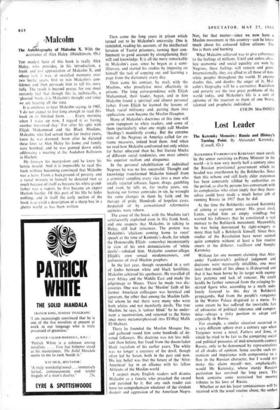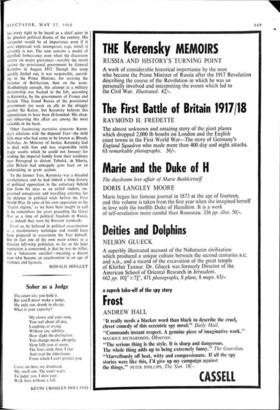Lost Leader
The Kerensky Memoirs : Russia and History's Turning Point. By Alexander Kerensky. (Cassell, 42s.) ALEXANDER FYODOROVICH KERENSKY must surely ' be the senior surviving ex-Prime Minister in the world—it is now very nearly half a century since the Russian provisional government which he headed was overthrown by the Bolsheviks. Since then this urbane and still lively elder statesman. has been constantly vilified by authorities on the period, as also by persons less conversant with its complexities who often imply that they them- selves could have made a much better job of running Russia in 1917 than he did.
At the time the Bolsheviks accused Kerensky of aiming at supreme power. His great rival, Lenin, called him an empty windbag—but warned his followers that he constituted a real menace to the Bolshevik movement. Meanwhile, he was being denounced by right-wingers as more than half a Bolshevik himself. Since then, studies of the Revolution have never seemed quite complete without at least a few routine sneers at the ditherer. vacillator and bungler Kerensky.
Without for one moment claiming that Alex- ander Fyodorovich's political judgment and decisions were -necessarily infallible, one must insist that much of this abuse is ill-deserved and that it has been borne by its target with exemp- lary patience and lack of rancour. He could hardly be farther removed from the cringing be- skirted figure who, according to a myth sedu- lously fostered to this day in Bolshevik propaganda, fled from the people's vengeance in the Winter Palace disguised as a nurse. To some extent he has suffered the inevitable fate of advocates of political tolerance and compro- mise—always a risky position to adopt and especially in Russia.
For example, a similar situation occurred in a very different sphere over a century ago when Turgenev wrote a novel, Fathers and Sons, in which he tried to be fair to the competing social and political pressures of mid-nineteenth-century Russia, only to be denounced by representatives of all shades of opinion. Some ascribe such ex- tremism and impatience with compromise to a flaw in the Russian character, but I would not make . this claim myself—nor, emphatically. would Mr Kerensky, whose -sturdy Russian patriotism has survived the long years. The book contains some restrained but moving tributes to his love of Russia.
Whether or not his latest reminiscences will be received with the usual routine abuse, the author has every right to be heard as a chief actor in the greatest political drama of the century. His viewpoint would be of importance even if it were expressed with intemperate rage, which it certainly is not. The tone remains a model of dignified forbearance even when the discussion centres on major grievances—notably the revolt against the provisional government by General Komilov in August 1917. Though this coup quickly fizzled out, it was responsible, accord- ing to the Prime Minister, for reviving the fortunes of Bolshevism, then on the wane. Maddeningly enough, this attempt at a military dictatorship was backed to the hilt, according to Kerensky, by the governments of France and Britain. They found Russia of the provisional government too weak an ally in the struggle against the Kaiser, but Kerensky believes this appreciation to have been ill-founded. His chap- ters rehearsing this affair are among the most valuable in the book.
Other fascinating narrative concerns Keren- sky's relations with the deposed Tsar—the mild little man who had come to be known as Bloody Nicholas. As Minister of Justice, Kerensky had to deal with him and was responsible (with tragic results which he could not foresee) for sending the imperial family from their residence near Petrograd to distant Tobolsk, in Siberia, after Britain had unhappily gone back on an undertaking to grant asylum.
To the former Tsar, Kerensky was a dreaded revolutionary and he had indeed a long history of political opposition to the autocracy behind him from his days as an exiled student, im- prisoned conspirator and travelling attorney for the defence in political trials before the First World War. In spite of his own opposition to the Tsarist regime,' as we have been taught to call it, he remembers the years preceding the Great War as a time of political freedom in Russia - as indeed they were by Russian standards.
Even so, he believed in political assassination as a revolutionary technique and would have been prepared to assassinate the Tsar himself. But in fact one of his own main crimes as a Russian left-wing politician, so far as his later reputation is concerned, is that he was no killer, but a 'lukewarm socialist'—meaning a decent man who became an anachronism in an age of violence and hysteria.
RONALD HINGLEY



































 Previous page
Previous page